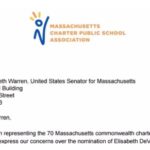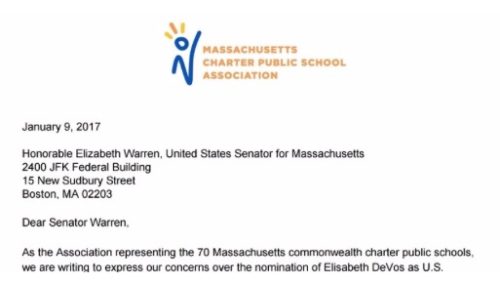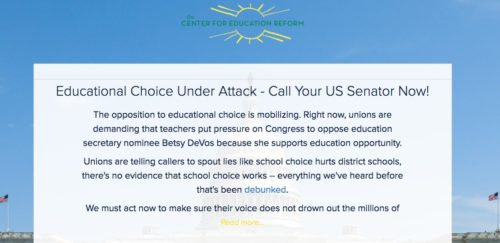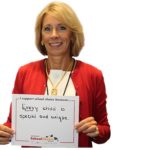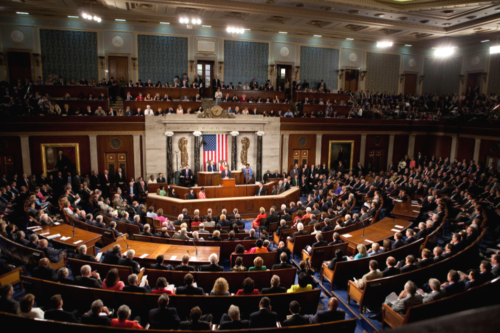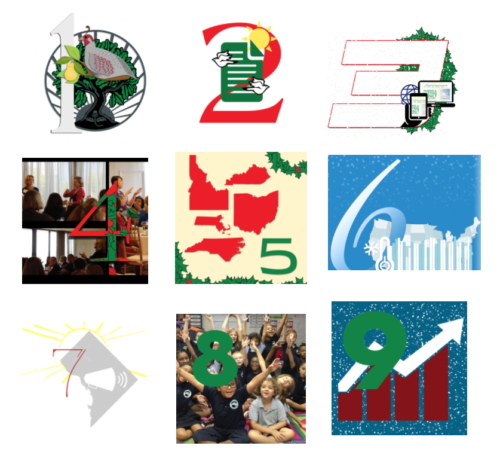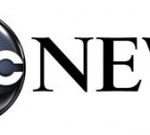
by Jordyn Phelps
ABC Online
January 17, 2017
Let the education wars begin.
Donald Trump’s choice to lead the Department of Education, Betsy DeVos, has the nation’s teachers unions preparing to re-enter battle over public education systems, a little over a year after a bipartisan education reform deal was reached on the Every Student Succeeds Act (ESSA).
DeVos, a wealthy Republican donor and activist, has been a long-time champion for school choice in her home state of Michigan, where she’s advocated in favor of vouchers and the expansion the state’s charter schools.
While DeVos’ admirers revere her as an effective disrupter who has put her own money into supporting school choice policies, her critics tie her to the checkered track record of Michigan’s charter schools and see her advocacy for vouchers as a threat to public education.
DeVos’ background, coupled with the president-elect’s campaign proposal to redirect $20 billion in federal dollars back to the states for use in voucher programs, has set the stage for a battle over the the nation’s education system.
Who Is Betsy DeVos?
DeVos, 59, has been involved in the promotion school choice policies for several decades in her home state of Michigan.
She is is married to Dick DeVos, son of billionaire Amway co-founder Richard DeVos. Together, the couple has used their wealth to influence the education debate in Michigan. They have both been active in state politics. DeVos spent several years as chairwoman of the state Republican Party, while her husband ran unsuccessfully for governor in 2006.
In 2000, the DeVoses led a campaign to amend the state constitution to allow school vouchers in the state. The proposal ultimately failed.
Since that time, DeVos has put her focus primarily on promoting and expanding charter schools and is considered one of the architects of Detroit’s charter school system.
She has helped to found several education-related organizations to promote increasing school choice policies, including the Alliance for School Choice, the Great Lakes Education Project and the American Federation for Children (AFC).
What Her Critics Say
Public education advocates and teachers unions paint a bleak picture of the charter school system in Michigan that DeVos has taken a leading role to promote. Many view her support for vouchers, which allow government education funds to follow each individual student to the public or private school of their parents choice, as a threat to public education.
The president of the American Federation of Teachers, Randi Weingarten, has labeled DeVos “the most anti-public education nominee” in the history of the Department of Education and contends that DeVos ultimately wants to replace public education with a private system.
“She’s enemy number one to children and to having a viable public education system there to help all kids,” said Weingarten. “She doesn’t want kids to have more options, she wants no public school options. She just wants a private system.”
According to excerpts from her opening remarks, DeVos is expected to offer assurances of her commitment to public education, pledging that she “will be a strong advocate for great public schools” but also will express her continued support for a “parent’s right to enroll their child in a high quality alternative” if a traditional public school is not a good fit for the child.
The National Education Association, another leading teachers union, similarly accuses DeVos of “undermin[ing] public education.”
“She has consistently pushed a corporate agenda to privatize, de-professionalize and impose cookie-cutter solutions to public education,” NEA President Lily Eskelsen García said in a statement.
Weingarten points to statistics of the state of charter schools in Michigan to make the case that DeVos has made things worse, rather than better, in Michigan education. She raises particular alarm at the high number of for-profit charter school operators as limiting transparency and accountability in the charter system.
“80 percent of the charters in Michigan are for-profit; it’s called the ‘Wild Wild West’ for a reason,” Weingartern said. “75 percent of all schools in the state perform better than the state’s charter schools.”
According to a Detroit Free Press investigation of Michigan’s charter schools published in 2014, “38% of charter schools that received state academic rankings during the 2012-13 school year fell below the 25th percentile [while] only 23% of traditional public schools fell below the 25th percentile.”
Though Weingarten said the AFT supports effective charter schools as one part of the overall public education system, she said the high number of for-profit operators coupled with a a lack of transparency — a situation which she blamed on DeVos — have been a negative formula for Michigan’s at-risk students. Weingarten specifically blames DeVos for killing a proposal for a school oversight commission that would have been run by the Detroit mayor’s office.
“She fought for no accountability,” Weingartern said in a speech at the National Press Club last week. “No accountability, even in cases like the Detroit charter schools that closed just days after the deadline to get state funding, leaving students scrambling to find a new school, but the charter operators still profiting.”
What Her Supporters Say
Supporters of DeVos paint a far different picture of her record and the state of charter schools in Michigan. They accuse DeVos’ critics of skewing data to argue that charter schools are under-performing traditional schools Michigan.
Gary G. Naeyaert, the Executive Director of the Michigan-based Great Lakes Education Project that was founded and bankrolled by Betsy and Dick DeVos, said that “while it’s true that 38% of charters fall into the bottom 25%,” he also points out that “85% of Detroit Public Schools fall into the bottom 25%.”
Matt Frendewey of the American Federation for Children, an organization that DeVos chaired until recently, takes issue with the criticism that DeVos has opposed accountability in Detroit’s charter schools.
“The only thing that she opposed was this un-elected, mayoral-appointed commission that was designed to essentially bolster the schools that had been failing at the expense of charter schools,” Frendewey said. “The whole reason school choice came about was because students were trapped in a failing system. It’s all about holding the system accountable.”
Jeanne Allen, the chairman and CEO of the Center for Education Reform, believes DeVos is the “right person” to tackle the “morass called the Department of Education” and said DeVos opposed to the oversight commission because it would have put control of the charters back under the control of the district from it was established as an alternative.
“She, as one of a group of advocates, said to the governor, ‘This is insane. Why would we actually give control of charter schools back to the districts for which they were created to allow parents an option,” Allen said. “And the governor told me, ‘That’s not what they told me was happening, thanks for clarifying.’ When you have the political weight of Betsy DeVos, that’s what you’re able to do.”
A New Education War?
If DeVos’ past is any indication of her future as the potential head of the Department of Education, her leadership is almost sure to reignite a fierce debate on education.
It’s a fight that Weingarten believes would be counterproductive so soon after Republicans and Democrats came together back in December 2015 to agree to the terms of ESSA — bipartisan legislation that she said had “no losers” and replaced the widely unpopular No Child Left Behind legislation.
“Really, reigniting these wars after we came to this consensus and solved programs?” she asked. “This was supposed to be the time to really roll up our sleeves and get this done, now that the policy piece was done.”
But on the other side of the debate, Allen said the education wars never really ended and she welcomes DeVos to lead the fight in favor of opening up more public and private school options in education.
“We’ve been fighting education wars for years. It doesn’t matter how tepid we are, any suggestion of changing the status quo emits screams and howls from the traditional establishment,” Allen said. “If we can’t be controversial … in debate about how to help our kids then we should be out of business.”










